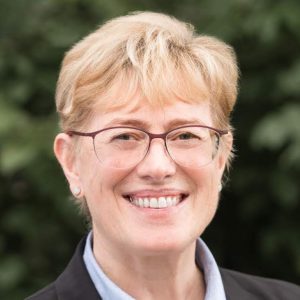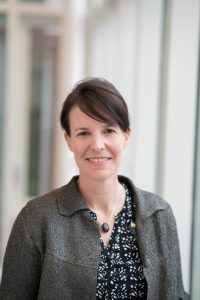December 8 at 12PM EST – Plenary Session on Climate Change: Lesson for Risk Analysts Post COP 26
Ann Bostrom
Ann Bostrom is the Weyerhaeuser Endowed Professor in Environmental Policy at the Daniel J. Evans School of Public Policy & Governance at the University of Washington. She joined the Evans School faculty in 2007 after serving on the faculty at Georgia Tech from 1992-2007. From 1999 to 2001 she took leave to co-direct the Decision Risk and Management Science Program at the National Science Foundation (NSF).
Bostrom researches mental models of hazardous processes (how people understand and make decisions about risks). Currently she is collaborating with interdisciplinary teams to study risk perceptions and communication strategies for environmental and health risks, for example, regarding climate change, tropical cyclones, earthquake and tsunami risks, and earthquake early warning. As a member of the risk communication and leadership teams in the new NSF AI Institute for Research on Trustworthy Artificial Intelligence in Weather, Climate, and Coastal Oceanography (AI2ES), she is also conducting research to better understand trust of AI by professionals in the environmental sciences.
Bostrom is the recipient of the Chauncey Starr Award and of the Distinguished Educator Award from the Society for Risk Analysis, of which she is a Fellow and Past President. Bostrom is also a Fellow and elected member of the Boards of Directors for the American Association for the Advancement of Science (AAAS) and the Washington State Academy of Sciences. She has served on science advisory committees for several federal agencies and contributed to National Academies workshops and reports on a variety of science and risk communication topics, ranging from assessing U.S. tsunami preparedness and reviewing the U.S. tsunami warning and forecast system, to managing cancer risks associated with radiation exposure during crewed space missions.
Dr. Bostrom holds a B.A. in English (creative writing) from the University of Washington, an M.B.A. from Western Washington University, which included studies at the Stockholm School of Economics, and a Ph.D. in policy analysis from Carnegie Mellon University. She also completed postdoctoral studies in Engineering and Public Policy at Carnegie Mellon University, and in cognitive aspects of survey methodology at the Bureau of Labor Statistics.

Nick Pidgeon
Nick is Professor of Environmental Psychology and Risk at Cardiff University and Director of the Understanding Risk Research Group there. His extensive interdisciplinary research portfolio looks at public engagement, communication and decision-making for environment, energy, and emerging technology risks.
Following his initial work on behavioral decision making and the organizational preconditions to major system accidents, he has specialized in the social and cultural determinants of risk perception and communication. He first collaborated with Roger Kasperson in the period 1998-2003, organizing the Cumberland Lodge Social Amplification Workshop and subsequent book of papers arising co-edited with both Roger and Paul Slovic (Cambridge University Press, 2003). He has led large research programmes on risk perception for the Leverhulme Trust and was a Co-Investigator of the US National Science Foundation Centre for Nanotechnology in Society at Santa Barbara (2005- 2015).
His current work looks at some of the societal challenges we face in meeting net zero carbon emissions through energy system change, climate resilience and adaptation, as well as the societal acceptability of carbon dioxide removal technologies. He has been a science advisor to the UK Energy and Climate Change Department, the UK Environment Department, and currently the UK Department for Transport. In 2006 Nick chaired the UK’s Cross-Party Parliamentary inquiry ‘Is a Cross-Party Consensus on Climate Change Possible – or Desirable?’ which recommended the setting up of the UK Climate Change Committee, an innovative climate governance mechanism which was the first of its kind in the world.
He was awarded an MBE by the Queen in 2014 for services to climate change awareness and UK energy security policy and is currently a member of SRA Council. He has spent a significant part of 2020 and 2021 in providing behavioral science and risk communication advice to both the UK and Welsh Governments.

Dr. Paul C. Stern
Paul C. Stern is president of the Social and Environmental Research institute and was previously a principal staff officer at the U.S. National Academy of Science, Engineering and Medicine where he directed its Board on Environmental Change and Society and staffed many studies and projects outside the purview of the Board. In these roles, he participated in risk-related Academy studies including Improving Risk Communication (1989), Understanding Risk: Informing Decisions in a Democratic Society (1996), and Public Participation in Environmental Decision Making (2008), which emphasized the importance of two-way communication and engagement of the range of interested and affected parties in risk governance and synthesized knowledge about how to achieve these objectives. Other major projects produced such volumes as Global Environmental Change: Understanding the Human Dimensions (1992), Governing the Commons (2002), Climate and Social Stress (2013), and Risks and Risk Governance in Shale Gas Development (2014).
His research interests more broadly seek to integrate social science into research and practice for governing anthropogenic environmental changes and risks and the use of common-pool resources. With colleagues, he developed the Value-Belief-Norm Theory of environmentally significant behavior, which has been used to understand consumer behavior and engagement in environmental movement activities. In his recent work, he has emphasized the many roles through which individuals affect environmental systems, identified general principles for designing initiatives for environmental and risk management, and sought to integrate considerations of initiative feasibility and behavioral plasticity into models and other analyses concerning the mitigation of environmental threats including those of climate change. He is coauthor of the textbook, Environmental Problems and Human Behavior (2nd edition, 2002).
He is a Fellow of the American Association for the Advancement of Science and the American Psychological Association.

Elizabeth Wilson
Dr. Elizabeth J. Wilson is the inaugural director of the Arthur L. Irving Institute for Energy and Society and Professor in the Environmental Studies Department at Dartmouth College. She studies how energy systems are changing in the face of new technologies and new societal pressures. Her work focuses on the implementation of energy and environmental policies and laws in practice. She is interested in how institutions support and thwart energy system transitions and focuses on the interplays between technology innovation, policy creation, and institutional decision making. Her books include Energy Law and Policy, Second Edition (West Academic Publishing) (with Davies, Klass, Tomain and Osofsky) and Smart Grid (R)evolution: Electric Power Struggles (Cambridge Press) (with Stephens and Peterson).
Before joining Dartmouth in 2017, Wilson was a professor at the University of Minnesota and was awarded a 2015 Andrew Carnegie Fellowship and spent the 2016-7 academic year at the Danish Technical University. She was selected as a 2014-5 CIC Academic Leadership Fellow. She was chosen as a Leopold Leadership Fellow in 2011. She spent the 2009-2010 academic year as a visiting professor at Tsinghua University, in Beijing, supported by McKnight Land-Grant Professorship.
Prior to joining the University of Minnesota she worked with the U.S. Environmental Protection Agency and before that Wilson worked in Belgium, Burundi and Tanzania. She holds a doctorate in Engineering and Public Policy from Carnegie Mellon University.
